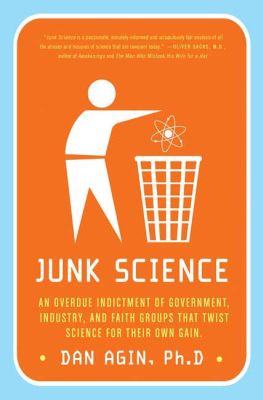

| JUNK SCIENCE An Overdue Indictment of Government, Industry and Faith Groups That Twist Science for Their Own Gain Dan Agin, Ph.D. New York: St. Martin Griffin, 2006 |
Rating: 5.0 High |
|||
| ISBN-13 978-0-312-37480-8 | ||||
| ISBN 0-312-37480-1 | 323pp. | SC | $14.95 | |
History shows us over and over again that the majority of corporate executives prefer to ignore what economists label "external costs": such expenses as the cost of safely disposing of waste byproducts from a manufacturing process.1 Dr. Agin looks at some case studies:
Dr. Agin provides much more detail on all of these cases. But the common factor is that corporate executives refused to address the problem until forced to do so, in the meantime proclaiming first that the idea of danger was absurd, then that there was no evidence justifying action, or the evidence was insufficient, and finally that the cost of remediation would be too high.
Enlightened medical practice recognizes the value of informed consent. It is morally right to tell patients about alternative treatment options and the risks and benefits each may have. This is the practical course as well; for it reduces the likelihood of malpractice suits. I would argue that "alternatives awareness" also cuts down on the mistakes that lead to such suits.
Indeed, I maintain that being constantly on the lookout for alternatives is a mindset that optimizes outcomes in any profession. Consider toxic waste. In general, the corporation producing the waste has three alternatives. It can dump the waste outside the property, leaving it to disperse in the environment; it can store the waste safely on site; or it can change its manufacturing processes so that waste is no longer produced.3 Only on a case-by-case basis can the costs of these options be quantified. But experience has shown that dumping toxic wastes leads to substantial penalties down the road.
Agin reserves his most devastating volleys for the tobacco industry. He thinks it outrageous that a product which causes millions of deaths continues to be sold, and regards industry executives as mendacious fools. He quotes one R. J. Reynolds Tobacco Company executive telling an actor (pages 89-90): "We don't smoke that s***. We just sell it. We just reserve the right to smoke for the young, the poor, the black, and the stupid." But Agin is not ranting here; the bombs he lobs are the tobacco pushers' own words, from internal memos and private remarks. Those internal communications have made it clear that they always knew nicotine was addictive and cigarettes are nicotine delivery systems, even though they consistently denied these facts.
We can expect that centuries from now the story of the tobacco industry in the twentieth and twenty-first centuries will be taught as a case study in the abuse of public trust by corporate profiteering. The scale is so vast, the calumny so blatant, the twisting of science so insidious, the misery and death produced so overwhelming, any account cannot possibly do the realities full justice. – Page 86 |
Each chapter begins with a pair of quotations, usually of opposing meanings. Consider Chapter 11: "Pollution: Private Interest and Public Poison." The quotations are:
Both men quoted recognize the reality of external costs. The difference is in whether they view dealing with those costs as responsible or otherwise. Milton Friedman apparently holds the latter view — at least judging by what Dr. Agin writes:
Milton Friedman's idea, quoted above, that social responsibility costs money, is what I call "wimpy thinking"—thinking weak and ineffective in logic, thinking with a superficial attitude often attached to an even more superficial philosophical precursor. Such thinking in the hands of many executives in industry usually produces a posture that results in either hiding science or twisting science to achieve corporate ends. A human society is a collection of individuals organized for mutual benefit but primarily for survival. When social interactions threaten survival of society, the main reason for the existence of society vanishes. The important conflict, apparently unrecognized by Friedman and others, is not between social responsibility and profits, but between short-term profits and long-term losses. In the complete absence of social responsibility, society dies (including shareholders!) and there are no profits for anyone. The idea that the need for corporate social responsibility is a nuisance invented by activists is maybe the most dangerous idea in the ranks of industry in America and elsewhere. – Pages 155-156 |
Dr. Agin is correct. First, it's a truism that corporate social responsibility, such as dealing with pollution emitted by your factory, costs money. The only question should be, "Will it cost more money if the pollution is not dealt with responsibly?" Experience from Love Canal to Times Beach has shown that the answer is almost always "Yes."4 Milton Friedman could hardly have been unaware of this. That leads me to wonder if he was quoted out of context.

 To contact Chris Winter, send email to this address.
To contact Chris Winter, send email to this address.